Katalin Szili wrote: ten years ago on this day in Marosvásárhely, at the initiative of the Székely National Council, the citizens' committee representing seven European countries was founded with the aim of achieving European legislation for the equality of the regions and the sustainability of regional cultures.
He drew attention to the fact that the European movement for the protection of national regions "has fought a significant part of its battles in the last ten years, thanks to persistent and tenacious work and the highest degree of steadfastness". He did this - he continued - in the meantime, the other major national minority protection citizen initiative, the Minority SafePack, was swept off the table by the European Commission along with all its proposals, saying that the matter of the supporting signatures of more than one million European citizens in relation to a specific problem area has either already been resolved or is effective strategy.
The politician asked the question, wasn't the institution of citizens' initiatives created so that citizens could directly influence the European Commission and its legislative process? Based on the facts so far, "we already know that this only works in principle (...), the citizens' initiative is just a cosmetic patch on the body of the EU institutional system," he wrote. He added: but then "what is the European movement, what is the protection of national minorities and national regions"?
According to his conviction, he continued, there are "at least twice a million reasons" for this. And the European Commission can decide whether it embraces its own institutional system and takes it seriously, how it participates in this level of national minority protection and whether it uses its own means to perform its tasks in accordance with the basic principles set out in the EU treaties, explained Katalin Szili.
He said:
the movement does not stop, minority protection may seem to be changing, but the well-being of national minorities is still a real challenge for modern communities, states and associations.
He added: that is why there is a great need for common thinking, legislation for coexistence, for the European movement to continue, so that the struggle for "understanding our position" finally reaches its goal.
"It may not be today, but we are confident that it will be tomorrow," said Katalin Szili in her statement.
The legal institution of the European Citizens' Initiative enables the citizens of the European Union to directly request the European Commission to present a legislative proposal in the area of its competence. The citizens' initiative must be supported by signatures of at least one million EU citizens from at least seven of the 27 EU member states. In each of the seven member states, the minimum required number of signatures for the given country must be collected, which means 15,750 in Hungary.
MTI
Cover image: Illustration / Photo: MTI/Tamás Kovács













